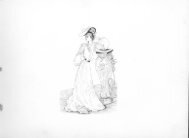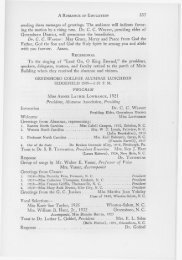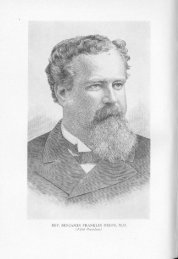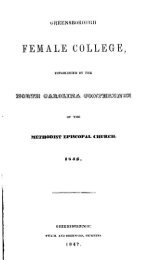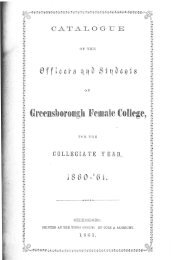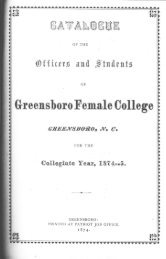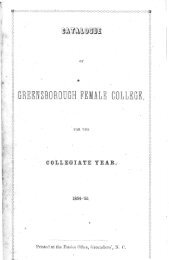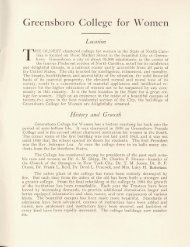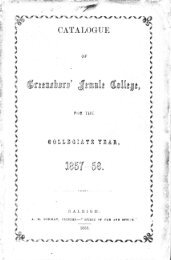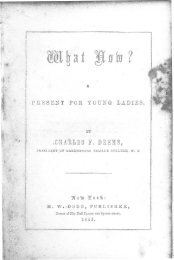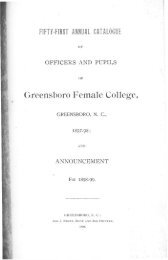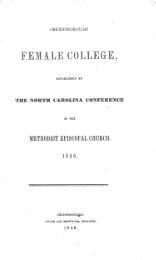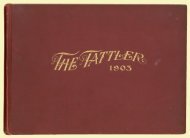Ch.5 Pt.2 - Brock Historical Museum of Greensboro College
Ch.5 Pt.2 - Brock Historical Museum of Greensboro College
Ch.5 Pt.2 - Brock Historical Museum of Greensboro College
You also want an ePaper? Increase the reach of your titles
YUMPU automatically turns print PDFs into web optimized ePapers that Google loves.
SECOND MAIN BUILDING<br />
Second in the Series <strong>of</strong><br />
the Four Stages <strong>of</strong> the<br />
‘‘Main Building.))
Artist’s sketch <strong>of</strong> the Second Main Building <strong>of</strong> <strong>Greensboro</strong><br />
Female <strong>College</strong>. August 27, 1873,- ten years and eighteen<br />
days after the fire <strong>of</strong> August 9, 1863,- restored building <strong>of</strong><br />
G.F.C., was re-opened for students,-to accommodate 200<br />
boarding students.
A ROMANCE OF EDUCATION 89<br />
DR. T. M. JONES AND PROFESSOR W. F. ALDERMAN<br />
By MRS. J. LEGRAND EVERETT (Lillie Moore) '87<br />
No institution is stronger or more permanent than is its foundation.<br />
But the foundation depends for its stability upon the vision, the faith,<br />
the determination, the integrity <strong>of</strong> its builders.<br />
<strong>Greensboro</strong> <strong>College</strong> is such an institution.<br />
Its foundation is the<br />
vision <strong>of</strong> it, the faith <strong>of</strong> it, the purpose for it embedded deep in the<br />
souls <strong>of</strong> those who planned and promoted it a century ago. Like unto<br />
the birth <strong>of</strong> a child, it was lovingly conceived and brought into being;<br />
nurtured with affectionate care during its formative years; and guided<br />
wisely through many and varied growing pains, till today, in maturity,<br />
it is seen firmly established in enduring strength <strong>of</strong> character upon<br />
the fundamentals <strong>of</strong> its creators. The vision: an institution <strong>of</strong> learning<br />
for woman, equipped with better facilities for higher education<br />
than had then been provided her; the faith: that she could and would<br />
use them wisely and well; the determining purpose: that there should<br />
be erected such an institution as they visualized, sponsored by the<br />
Church, and managed by the best Christian teachers under the most<br />
wholesome influence possible to secure, to produce the highest type <strong>of</strong><br />
womanhood. Higher education for women was a new and unpopular<br />
cause at that time, and for a number <strong>of</strong> years, those who promoted it<br />
had no easier task than other pioneers have had. Chief among the<br />
pioneer builders <strong>of</strong> <strong>Greensboro</strong> Female <strong>College</strong> were Turner Myrick<br />
Jones and William Franklin Alderman.<br />
Both have been numbered also among the builders <strong>of</strong> <strong>Greensboro</strong>.<br />
Time has demonostrated that they were builders <strong>of</strong> our state as well.<br />
They were not wealthy men. They probably had little capital to invest<br />
in money making concerns for the commercial interests <strong>of</strong> the community,<br />
but they did have something far more pr<strong>of</strong>itable than mere<br />
money to invest- they had themselves, and those, they poured out generously<br />
into real investments. They invested themselves in lives, the<br />
dividends from which, still accruing are richer by far than any that<br />
mere wealth could have declared. In the lives <strong>of</strong> hundreds <strong>of</strong> girls,<br />
students in old G.F.C., who during almost a half century were<br />
passing and lingering under their beneficent influences. Girls, who<br />
inspired here by radiant visions <strong>of</strong> youth, went out from the old <strong>College</strong>,<br />
imbued with the spirit <strong>of</strong> its fine ideals, its high standards, to<br />
assume the responsibilities <strong>of</strong> their womanhood, and to meet their obligations<br />
in life, better prepared to do so for having felt the impact <strong>of</strong><br />
those two great personalities upon theirs, and instill into new generations<br />
the principles <strong>of</strong> righteous character, so constantly taught by them<br />
in precept and example. Girls who became the great-grandmothers<br />
and grandmothers <strong>of</strong> today, having borne and reared many <strong>of</strong> those<br />
who have builded built our State into a good place in which to live, who
90 A ROMANCE OF EDUCATION<br />
staff our institutions, and have made our Church an open door <strong>of</strong><br />
opportunity through which any who desire to serve their fellow crea-<br />
tures may find a way to do so.<br />
They were both educators by choice, and eminently qualified for<br />
their pr<strong>of</strong>ession by superior natural endowments and the excellent edu-<br />
cation each had acquired. Dr. Jones, the elder by fourteen years, was<br />
graduated from Randolph-Macon <strong>College</strong> in Virginia with A. M. and<br />
A. B. degrees. And Pr<strong>of</strong>essor Alderman, after a period <strong>of</strong> study at<br />
Randolph-Macon, returned to the University <strong>of</strong> North Carolina, from<br />
which he was graduated with high honor, receiving his A. M. degree.<br />
During several years after their graduation, each taught most success-<br />
fully in various places. They were both native North Carolinians, <strong>of</strong><br />
old and honorable lineage. Both were happily married, and reared<br />
large families <strong>of</strong> sons and daughters to honor and bless them.<br />
In the middle eighties when I was a student here, Dr. Jones and<br />
Pr<strong>of</strong>essor Alderman were the only men on the faculty. Dr. Jones<br />
came to the <strong>College</strong> in 1853, as Pr<strong>of</strong>essor <strong>of</strong> Ancient Languages and<br />
Mathematics. The next year, upon the resignation <strong>of</strong> Dr. Deems, he<br />
was unanimously elevated to its presidency. Pr<strong>of</strong>essor Alderman came<br />
in 1860, as Treasurer and Pr<strong>of</strong>essor <strong>of</strong> Ancient Languages and Mathe-<br />
matics. During the years between the burning <strong>of</strong> the <strong>College</strong> in 1863<br />
and its re-opening in 1873, both men were teaching, though Dr. Jones<br />
as financial agent <strong>of</strong> the college, spent the first two years in soliciting<br />
funds for another college building. After this, he opened a school<br />
in Louisburg, and invited Pr<strong>of</strong>essor Alderman to join his faculty. He<br />
accepted and remained there till the school was closed, when he went<br />
to Maysville. Both Dr. Jones soon had to leave Louisburg on account<br />
<strong>of</strong> illness. Within a year, however, he opened a school in Warrenton,<br />
where he taught until he was recalled to <strong>Greensboro</strong>.<br />
There are no finer examples <strong>of</strong> genuine patriotism, amounting in<br />
many instances to real heroism, than were displayed by our southern<br />
teachers during the dark days <strong>of</strong> the years following the close <strong>of</strong> the<br />
Civil War, and these young teachers <strong>of</strong> ours were two <strong>of</strong> the finest.<br />
It would be impossible to describe the hardships they endured, or to<br />
depict the discouraging conditions, the difficulties and discomforts<br />
under which they labored-we can only imagine them in the light <strong>of</strong><br />
the history <strong>of</strong> that period.<br />
But the sentiment was general and strong for rebuilding the col-<br />
lege at <strong>Greensboro</strong>. A real necessity was recognized in the State for<br />
such an institution as it had been. Dr. Jones expressed the belief that<br />
“what <strong>Greensboro</strong> Female <strong>College</strong> had done in the few years <strong>of</strong> its<br />
life, for and with young womanhood, had removed many prejudices<br />
from the public mind on the subject <strong>of</strong> female education. The <strong>College</strong><br />
had, by illustrating the importance <strong>of</strong> female education, created a
A ROMANCE OF EDUCATION 91<br />
deeper interest on that subject; it had demonstrated the capacity <strong>of</strong><br />
women for making high attainments in intellectual culture; it had<br />
contributed much to elevate the standards <strong>of</strong> female requirements in<br />
the schools <strong>of</strong> the land; and it had sent out from its hall hundreds<br />
<strong>of</strong> well educated Christian women to adorn and to bless society and<br />
the Church.” So the <strong>College</strong> was rebuilt, and in 1873 opened for<br />
the reception <strong>of</strong> students, with Dr. Jones and Pr<strong>of</strong>essor Alderman<br />
heading the faculty in their same old positions.<br />
I suppose there are seldom seen two unrelated people so closely<br />
associated for so many years in the same business concern, both pos-<br />
sessed <strong>of</strong> so many <strong>of</strong> the essential principles <strong>of</strong> honorable, upright char-<br />
acter, so much alike in many ways, yet whose personalities were so un-<br />
like, as were those <strong>of</strong> these two great men. Both were refined, gentle,<br />
kind, patient, and courteous, but firm as a rock when necessary. We<br />
knew that they both held us in fatherly affection, and felt sincere<br />
interest in all <strong>of</strong> our doings. But Dr. Jones was reserved, alo<strong>of</strong>,<br />
rather austere in his manner, while Pr<strong>of</strong>essor Alderman was genial,<br />
affable, and approachable at all times. Dr. Jones, as president, was,<br />
<strong>of</strong> course, more prominently before the public, but Pr<strong>of</strong>essor Alder-<br />
man, while recognized as next highest in authority, was more privately<br />
engaged, busy in his class work in the <strong>College</strong>, for all the Mathematics<br />
and Latin subjects were taught by him from the sophomore year<br />
through the senior. We honored and loved them both, but most <strong>of</strong> us<br />
simply adored our “dear old Fessor.” He was the sweetest, gentlest<br />
soul! We used to run down the long walk to meet him when he would<br />
be coming up to school mornings, and his eyes would twinkle with<br />
merriment and his face wreathe itself in smiles to see us. It was no<br />
unusual thing to see him coming swinging along up the hill, a girl<br />
hanging on each arm, two or three walking along backward in front in<br />
order to see and talk to him, several others bringing up the rear, all<br />
chatting together as if <strong>of</strong> the same age. We loved him then and we<br />
hold him in loving memory now-we old grandmothers!<br />
The higher education <strong>of</strong> women was so supremely important to<br />
them both, that during the thirty years <strong>of</strong> their association, they<br />
worked together daily in unbroken harmony <strong>of</strong> plan and action to<br />
promote its interests through the <strong>College</strong>, as well as for the good <strong>of</strong><br />
the big family <strong>of</strong> students and teachers there. I am convinced that<br />
<strong>Greensboro</strong> <strong>College</strong> is what it is today largely because <strong>of</strong> that har-<br />
monious co-operation between those two great builders <strong>of</strong> it. Dr. Jones<br />
became in a sense the personification <strong>of</strong> the <strong>College</strong>, he was so closely<br />
identified with it. Dr. F. L. Reid, who was later a president <strong>of</strong> the<br />
<strong>College</strong>, said <strong>of</strong> him in 1890 at the time <strong>of</strong> his death, that “Dr. Jones<br />
has done more for the higher education <strong>of</strong> females, than any other<br />
one man in the State, and he will live on in the lives <strong>of</strong> hundred <strong>of</strong>
92 A ROMANCE OF EDUCATION<br />
noble, consecrated women who bless the world because <strong>of</strong> their hav-<br />
ing been educated by him.” And Charles Lee Raper wrote <strong>of</strong> him in<br />
1898, that “he was one <strong>of</strong> the most noble and cultured teachers this<br />
State has produced. As a teacher and guide <strong>of</strong> young women he has<br />
no superior, and with the exception <strong>of</strong> Dr. Smedes, no equal.” Excell-<br />
ing in the literary attainments <strong>of</strong> a well-rounded scholar, he was noted<br />
also as a leader in our Church which honored him with many responsi-<br />
bilities. He was licensed to preach, but felt a greater urge to the min-<br />
istry <strong>of</strong> teaching. And old Trinity <strong>College</strong>, <strong>of</strong> which he was a trustee,<br />
in 1870 conferred upon him the degree <strong>of</strong> Doctor <strong>of</strong> Divinity.<br />
Of Pr<strong>of</strong>essor Alderman, Mrs. Metta Folger Townsend, his for-<br />
mer student and devoted friend said, “there is no possible way <strong>of</strong><br />
measuring the good that Pr<strong>of</strong>essor Alderman accomplished in his deal-<br />
ing with girls at G.F.C. Though much <strong>of</strong> his work was in the<br />
field <strong>of</strong> mathematics, he had a pr<strong>of</strong>ound love for literature. He read<br />
widely, and always the best held its appeal for him. His familiarity<br />
with the English classics was remarkable He went on his modest<br />
way, loving music, poetry, all those immaterial things which have been<br />
dear to seers <strong>of</strong> visions, but <strong>Greensboro</strong> today is a better <strong>Greensboro</strong><br />
because W. F. Alderman held such high place in its beginnings<br />
His religious life was so much a part <strong>of</strong> the man, you could not differ-<br />
entiate it from his life as a teacher. You might speak <strong>of</strong> his connec-<br />
tion with West Market Church, his loyalty to that organization, his<br />
long service as treasurer there, but when you have stated these facts,<br />
you have not given any idea <strong>of</strong> the gentleman who walked in his<br />
Master’s footsteps, wearing always the white flower <strong>of</strong> a blameless<br />
life, but wearing it without ostentation- a Christian gentleman in deed<br />
and in truth.” The North Carolina Christian Advocate in an editorial<br />
at the time <strong>of</strong> his death, said, “No finer Christian gentleman ever<br />
lived among us than Pr<strong>of</strong>essor W. F. Alderman. He was <strong>of</strong> that rare<br />
type <strong>of</strong> cultured man all too scarce in our day and generation. As<br />
gentle as a woman in manner, he was yet as firm as a rock in his<br />
adherence to the right, and he never swerved from the path <strong>of</strong> Chris-<br />
tian duty. He loved God supremely and his neighbor as himself, and<br />
he goes to his reward, leaving behind, a record that is ‘without spot<br />
or wrinkle or any such thing.’ He was the sort <strong>of</strong> man that a cultured<br />
Christian Educator like Dr. T. M. Jones would naturally associate<br />
with himself in the delicate work <strong>of</strong> training young women for their<br />
life work.’’ Thus, these two friends and co-workers in a great cause,<br />
were highly regarded by their peers for what they accomplished, held<br />
in exalted esteem by all who knew them for what they were, respected,<br />
honored and loved to the point <strong>of</strong> reverence by their students <strong>of</strong> whose<br />
entire trust and loyalty they were possessed, and they wore the dignity<br />
and honor <strong>of</strong> their positions and achievements both modesty and
A ROMANCE OF EDUCATION 93<br />
worthily till they laid them all down and made their departures from<br />
the earthly houses <strong>of</strong> their tabernacles to enter into buildings <strong>of</strong> God,<br />
houses not made with hands eternal in the heavens, prepared for them<br />
by Him whom they had loved and served.<br />
DEATH OF REV. DR. T. M. JONES<br />
Raleigh Christian Advocate, Wednesday, July 2, 1890<br />
REV. F. L. REID, Editor<br />
Just as we were closing up this issue for the press the wires flashed<br />
to us the following sad news:<br />
“<strong>Greensboro</strong>, N.C., June 30, 1890<br />
“To Rev. Dr. F. L. Reid:<br />
94 A ROMANCE OF EDUCATION<br />
A fuller sketch <strong>of</strong> this eminent educator and good man, giving<br />
more in detail, giving the strong points <strong>of</strong> his character, his life-work<br />
and an account <strong>of</strong> his last hours, will be given hereafter. He died <strong>of</strong><br />
some organic disease <strong>of</strong> the heart. To the greatly bereaved children<br />
(he leaves five sons and three daughters) we tender the most sincere<br />
sympathy in this hour <strong>of</strong> their great sorrow.<br />
MEMOIR OF DR. T. M. JONES<br />
By REV. L. W. CRAWFORD<br />
Rev. Turner Myrick Jones, D. D., the subject <strong>of</strong> this sketch, was<br />
born in Franklin County, N.C., on the 4th <strong>of</strong> June, 1819, and died<br />
in the City <strong>of</strong> <strong>Greensboro</strong> at 1 o’clock p.m., June 30, 1890, aged<br />
71 years and 26 days.<br />
His father’s name was Amos Jones, a local minister <strong>of</strong> the Meth-<br />
odist Church. His mother’s maiden name was Mary Anne Myrick-<br />
both were natives <strong>of</strong> Franklin County. They had twelve children- six<br />
sons and six daughters. Turner M. Jones was the eleventh child<br />
He was brought up on the farm, where he formed habits <strong>of</strong> indus-<br />
try and the habit <strong>of</strong> early rising, and also learned to attend<br />
to business. His early educational advantages he regarded as defective.<br />
He attended what in those days was called “old field schools.” In<br />
them he learned to spell and read, and the fundamental rules <strong>of</strong><br />
arithmetic, and committed to memory Murray’s English grammar. So<br />
it is evident that he made the most <strong>of</strong> his opportunities. He was pre-<br />
pared for college in a boarding school, six miles from his father’s<br />
house. From there he went to Randolph-Macon, the joint males col-<br />
lege <strong>of</strong> Virginia and North Carolina Conference. Before graduating<br />
he left college on account <strong>of</strong> failing health.<br />
While resting at home he soon recovered and afterward engaged<br />
in teaching in the family <strong>of</strong> Mr. Edward Alston <strong>of</strong> Warren County.<br />
At the close <strong>of</strong> the year he was elected Principal <strong>of</strong> Ridgeway<br />
Academy in Warren County. He continued there two and a half<br />
years.<br />
In 1845, two years after the time he would have graduated had<br />
he continued at <strong>College</strong>, he attended Randolph-Macon Commence-<br />
ment, was examined and received his degree <strong>of</strong> A. B., from the hand<br />
<strong>of</strong> L. C. Garland, President <strong>of</strong> the <strong>College</strong>.<br />
In the fall <strong>of</strong> this year he was married to Miss Augusta T. Stone<br />
<strong>of</strong> Franklin County. After eleven years <strong>of</strong> real conjugal happiness<br />
she died, leaving four children. (One child had died.)<br />
He spent ten and a half years teaching in private families and in<br />
male academies. Two and a half years <strong>of</strong> the time were spent in<br />
Warren County and seven and a half years in Franklin County. At<br />
one time his school had in it sixty boys and young men, which was a
A ROMANCE OF EDUCATION 95<br />
very unusual thing in that day, and showed the efficiency and popu-<br />
larity <strong>of</strong> the young teacher.<br />
In 1853 he was elected to the Pr<strong>of</strong>essorship <strong>of</strong> Mathematics and<br />
Ancient Languages in <strong>Greensboro</strong> Female <strong>College</strong>, then under the<br />
presidency <strong>of</strong> Rev. Charles F. Deems. In this capacity he remained<br />
one scholastic year. In December, 1854, Dr. Deems resigned the<br />
presidency, and Pr<strong>of</strong>essor Jones was unanimously chosen to fill his<br />
place. This was a great responsibility upon one so young and modest,<br />
but it proved a most fortunate selection for the Institution, for in a<br />
short while the patronage <strong>of</strong> the <strong>College</strong> became greater than the<br />
capacity <strong>of</strong> the building, and as many as twenty young ladies had to<br />
be boarded outside.<br />
On the 9th <strong>of</strong> August, 1863, a few days after the fall session<br />
opened, the <strong>College</strong> building was destroyed by fire. This was felt to<br />
be a calamity by the whole State. Every room in the building was<br />
occupied at the time, and as many as fifty pupils had been refused<br />
admission for want <strong>of</strong> room. For the next two years Pr<strong>of</strong>essor Jones<br />
was engaged in raising funds for the purpose <strong>of</strong> rebuilding the Col-<br />
lege. At this time the Civil War closed, and all plans for rebuilding<br />
were discontinued.<br />
In December, 1865, he went to Louisburg, and in January, 1866,<br />
opened a school there. The school prospered until the fall <strong>of</strong> 1868.<br />
In January, 1869, he left Louisburg on account <strong>of</strong> sickness in the<br />
school and went to Kittrell, where he remained five months.<br />
In the summer <strong>of</strong> 1869 he leased Warrenton Female <strong>College</strong> and<br />
removed his school thither, where he continued teaching until the end<br />
<strong>of</strong> the spring session in June, 1873. In Warrenton his school was<br />
prosperous, and large inducements were <strong>of</strong>fered to keep him there, but<br />
his attachments to <strong>Greensboro</strong> caused him to accept the Presidency <strong>of</strong><br />
<strong>Greensboro</strong> Female <strong>College</strong>, the new building having been completed.<br />
He remained the faithful, honored, and loved President <strong>of</strong> that noble<br />
institution until his connection with it was severed by death.<br />
Rev. T. M. Jones was married, the second time, to Miss Lucy<br />
McGee, <strong>of</strong> Chatham County, on June 2, 1857. She was a lady in<br />
every particular eminently fitted for the high and responsible position<br />
to which she was called. Her noble nature, her large endowments, her<br />
thorough culture, her entire consecration to the duties involved in her<br />
position, greatly enlightened the care and burdens <strong>of</strong> the President, and<br />
promoted in every way the interests <strong>of</strong> the Institution.<br />
The fruit <strong>of</strong> this marriage was seven children. On the 2nd <strong>of</strong><br />
November, 1884, this sainted woman, affectionate wife and devoted<br />
mother, was called by death from earth away, full <strong>of</strong> honor, loved<br />
and revered by many hundreds <strong>of</strong> young ladies to whom she had acted<br />
the part <strong>of</strong> friend, teacher and mother. Here came the great sorrow
96 A ROMANCE OF EDUCATION<br />
<strong>of</strong> Dr. Jones’ life. He felt that the great loss to himself and the<br />
Institution by her death was irreparable-in this he found in after<br />
years that he was not mistaken.<br />
HIS RELIGIOUS LIFE<br />
In his thirteenth year, on Tuesday night, at a camp-meeting held<br />
at Schocco Church on Warren Circuit, after an exhortation <strong>of</strong> Rev.<br />
James Reid, who was Presiding Elder at that time, he went to the<br />
altar for prayer, and pr<strong>of</strong>essed conversion that night. He soon afterward<br />
joined the Methodist Episcopal Church, South, and became a useful<br />
devoted and prominent member. He never attended a circus, a<br />
theater, or any <strong>of</strong> those worldly amusements or dissipations that have<br />
been so hurtful to many pr<strong>of</strong>essing Christians.<br />
He devoted much time to and realized much benefit from prayer,<br />
reading the Scriptures and religious books and papers.<br />
At the age <strong>of</strong> thirty-four years he was licensed to preach while<br />
teaching in the Male Academy in Louisburg. He, as a preacher, was<br />
sound in doctrine, clear, accurate and scholarly in the presentation <strong>of</strong><br />
the truth. His style was finished, attractive and popular with educated<br />
and literary people. He was in great demand by the churches and<br />
ministers. However, he always shrank from pulpit work. While he<br />
desired always to answer the calls <strong>of</strong> duty, he never pushed himself<br />
forward or sought opportunity to preach for personal notoriety.<br />
He never joined the Conference, though urged to do so. He preferred<br />
to remain in the local ranks. The pressure <strong>of</strong> his pr<strong>of</strong>essional<br />
work and college duties was so great he neither had time nor strength<br />
to do much outside work. When he accepted invitations to preach he<br />
made thorough preparation. His sermons were always <strong>of</strong> a high order,<br />
beautiful in conception and sentiment, and adorned with the graces <strong>of</strong><br />
rhetoric and gems <strong>of</strong> thought. Great congregations listened with delight<br />
and pr<strong>of</strong>it as he dispensed the word <strong>of</strong> life as occasion <strong>of</strong>fered.<br />
For a great many years he was elected annually to the sessions <strong>of</strong> the<br />
North Carolina Conference, and several times he was chosen as a<br />
member <strong>of</strong> the General Conference <strong>of</strong> the Methodist Episcopal<br />
Church, South. His ability was recognized in these bodies, and he was<br />
<strong>of</strong>ten honored by them with responsible and difficult duties.<br />
A few years ago the honorary degree <strong>of</strong> Doctor <strong>of</strong> Divinity was<br />
conferred upon him by Trinity <strong>College</strong>. All who knew him felt that<br />
he was well worthy <strong>of</strong> this distinction, and he wore it with grace and<br />
reflected honor upon the title and the Institution which gave it.<br />
His life-work was well chosen. He was an educator by nature<br />
and by pr<strong>of</strong>ession. He was preeminently fitted to be the President <strong>of</strong> a<br />
great Female <strong>College</strong>. Scholarly and cultured, he was firm, gentle,<br />
pains-taking and patient.
A ROMANCE OF EDUCATION 97<br />
Refined in his nature and tastes, tender in his manner and deli-<br />
cate in his sensibilities, always in sympathy with the pure, the good,<br />
the beautiful in character and deportment, he had all the qualities<br />
essential to success as a female educator. It was not surprising to his<br />
friends, that he achieved success as a female educator. It was not sur-<br />
prising to his friends, that he achieved success and fame in his high<br />
calling. He has for years been recognized in the Methodist Episcopal<br />
Church, South, as one <strong>of</strong> their foremost educators. He was respected,<br />
honored, and venerated by the members <strong>of</strong> his pr<strong>of</strong>ession wherever<br />
known. While always modest in his pretensions and claims, he was<br />
an accurate, well rounded scholar, and excelled in the higher literary<br />
and classical attainments.<br />
For twenty-six years he was the honored President <strong>of</strong> <strong>Greensboro</strong><br />
Female <strong>College</strong> and under his management this became universally<br />
regarded as one <strong>of</strong> the first female schools in the South. Few institu-<br />
tions have made for themselves such a proud history as has <strong>Greensboro</strong>.<br />
Thousands <strong>of</strong> young ladies have been educated within her walls, and<br />
they have gone out as ornaments in society, and as educated, refined<br />
Christian women, whose lives have been an incalculable blessing to our<br />
church and our country. (President ten years additional elsewhere).<br />
Most <strong>of</strong> these bear the impress <strong>of</strong> their great teacher, and carry<br />
with them the highest respect and strongest affection for their devoted<br />
and accomplished president and preceptor, and today there is mourn-<br />
ing throughout the State by hundreds <strong>of</strong> those who sat as pupils in his<br />
presence; and by their lives they testify to his efficiency and ability and<br />
by their tears they testify to their love for his person and memory.<br />
Dr. Jones had been in feeble health since Commencement, though<br />
he had continued at work as usual until last Friday morning. On that<br />
day he came to this church to attend the funeral <strong>of</strong> Mrs. Virginia<br />
Baker <strong>of</strong> this city, a former pupil and a devoted friend. He was here<br />
taken sick and was conveyed at once to the <strong>College</strong>. His physician<br />
found him suffering greatly from heart and stomach complications. He<br />
from the first was thought to be in a critical condition. Dr. Jones<br />
himself thought he would not recover, owing to his age and debility.<br />
He So expressed himself to his family. He told them his life’s<br />
work was done; assured them <strong>of</strong> his abiding faith in God and acpuiescence acquiescence<br />
in his Heavenly Father’s will; he expressed great satisfaction in<br />
the assurance “That neither death, nor life, nor angels nor principali-<br />
ties, nor powers, nor things present, nor things to come, nor height,<br />
nor depth, nor any other creature shall be able to separate us from the<br />
love <strong>of</strong> God in Christ Jesus our Lord.”<br />
During his brief, but very severe illness, he suffered much, but<br />
bore it patiently, and had his soul refreshed by prayer, and nourished<br />
by grace and the Holy Spirit. He was ready and willing and waiting
98 A ROMANCE OF EDUCATION<br />
for the Father’s will to be done. After lying in an unconscious state<br />
for several hours, at ten minutes to one o’clock on yesterday p.m.,<br />
“<br />
The silver cord was loosed and the golden bowl was broken, and<br />
his pure spirit returned to God who gave it.” “Mark the perfect man<br />
and behold the upright, for the end <strong>of</strong> that man is peace.”<br />
(Three stanzas <strong>of</strong> hymn: “Servant <strong>of</strong> God well done-The pains<br />
<strong>of</strong> death are past Soldier <strong>of</strong> Christ well done<br />
TRIBUTE TO DR. T. M. JONES BY C. F. DEEMS<br />
(In Raleigh Christian Advocate, Aug. 20, 1890- p. 1.)<br />
(Written While Dr. Deems Was Abroad)<br />
The Lord makes His saints to differ as He makes His stars. A<br />
man more exactly the opposite to John Tillett (whose character, Dr.<br />
Deems had just portrayed in the same article in the Advocate) in<br />
everything except heart-honesty, was Turner M. Jones. He was as<br />
gentle as a good sweet child. His manners were as s<strong>of</strong>t as those <strong>of</strong> the<br />
gentler kind <strong>of</strong> woman. He was regular, systematic and precise. What<br />
he accomplished came to pass from no push but from the persistence<br />
<strong>of</strong> a man who laid the weight <strong>of</strong> his character against that which<br />
was to be overcome. He was born apparently to be an instructor. I<br />
saw that and secured his call to <strong>Greensboro</strong> <strong>College</strong> as Pr<strong>of</strong>essor that<br />
he might be my successor in the Presidency. And I believe that from<br />
the time <strong>of</strong> his election until his departure no other man was ever<br />
thought <strong>of</strong> for the position. He was a true friend. He was a member<br />
<strong>of</strong> the Institute (viz., established by Dr. Deems).<br />
(MISS) “DORA DUTY JONES”<br />
An Appreciation from Dr. C. Alphonso Smith, <strong>of</strong> the University <strong>of</strong> Virginia<br />
(<strong>Greensboro</strong> Daily Record, 4-3-13)<br />
The interment <strong>of</strong> Miss Dora Duty Jones, who died in London,<br />
February 3, 1913, took place privately yesterday (3/Ap/13) in Green<br />
Hill Cemetery in the presence <strong>of</strong> a few <strong>of</strong> her surviving relatives.<br />
The announcement <strong>of</strong> the death <strong>of</strong> Miss Dora Duty Jones on<br />
February 3rd will bring grief not only to those whose privilege it<br />
was to know and love her, but to that wider international circle who<br />
recognized the rare originality <strong>of</strong> her work, and who sought and<br />
found both light and leading in her writing. The sum <strong>of</strong> her achieve-<br />
ments for the last twelve years is a record <strong>of</strong> courage, <strong>of</strong> persistence,<br />
and <strong>of</strong> final victory that will form a quickening and enduring heritage<br />
to all those who admire a noble ideal nobly and unfaltering pursued.<br />
I count it one <strong>of</strong> the privileges <strong>of</strong> my life in Berlin during the<br />
winter <strong>of</strong> 1910-1911 to have renewed with Miss Jones an acquaint-<br />
ance that had begun in early boyhood. Even in the old days her per-<br />
sonality had about it a suggestion <strong>of</strong> distinction, a flavor <strong>of</strong> uniqueness,
MISS DORA DUTY JONES
A WORD-PICTURE OF MISS DORA D. JONES<br />
Medium size, well developed. Medium height. Fair complexion. Blue eyes.<br />
Dark hair.<br />
Her traits <strong>of</strong> character, according to one who knew her well in college were:<br />
Very intelligent ; cheery disposition ; most gracious woman at all times ; equal<br />
to any emergency; was well fitted to take her mother’s place as Lady Principal.<br />
She was very tender and tactful with her younger brothers, coaxed rather than<br />
demanded. For example, she would say: “Sis Dora wishes you to do so and so.”<br />
As a student in college this one, describing Miss Dora, said: “I always felt<br />
free to go to Miss Dora for advice, and I always found her advice to be wise<br />
and freely given.”<br />
Another one-an intimate friend <strong>of</strong> Miss Dora Jones-made special reference<br />
to Miss Dora as being always “well-groomed”, indicating excellent taste in dress.<br />
MISS DORA DUTY JONES<br />
Daughter <strong>of</strong><br />
REV. TURNER M. JONES, A.M., D.D.<br />
and<br />
MRS. LUCY MCGEE JONES (Second Wife)<br />
Born in <strong>Greensboro</strong>, N.C., November 30, 1859.<br />
Died in London, February 3, 1913.<br />
Buried in Green Hill Cemetery, <strong>Greensboro</strong>, N.C., April 3, 1913.<br />
(Body cremated in London-ashes interred in T. M. Jones’ Plot, Green Hill<br />
Cemetery, <strong>Greensboro</strong>, N.C.)
A ROMANCE OF EDUCATION 99<br />
a note <strong>of</strong> dedication as unmistakable as it was rare and attractive. As<br />
Lady Principal <strong>of</strong> the <strong>Greensboro</strong> Female <strong>College</strong>, as lecturer on art<br />
as she knew it at first hand in the great European galleries, as teacher<br />
<strong>of</strong> lyric diction in New York, she had already given evidence <strong>of</strong> great<br />
powers about to become greater. Intellect and insight, scholarship and<br />
enthusiasm were so blended as to hint <strong>of</strong> some unique and compelling<br />
achievement when the larger opportunity <strong>of</strong>fered. The larger oppor-<br />
tunity came when she settled permanently abroad and began to teach<br />
the mechanism <strong>of</strong> the human voice and its application in speaking and<br />
singing. In 1907, after a year <strong>of</strong> successful teaching in Florence, she<br />
moved to Berlin, where the opportunities were greater because the<br />
competition was keener. Here her work met with instant and increasing<br />
acclaim. No one in the large American colony in Berlin, varied as<br />
were its interests and specialized as were its activities, seemed to me<br />
to be doing work comparable with hers for originality, for helpfulness,<br />
or for purely scientific excellence. She taught Germans how to sing<br />
German, Italians how to sing Italian, Frenchmen how to sing French,<br />
Englishmen and Americans how to sing English. Among her students<br />
were men and women already famous on the stage, but who were<br />
among the first to recognize that she alone had detected unerringly<br />
their vocal limitations and had unerringly pointed the way to increased<br />
resonance in both speech and song.<br />
The fame <strong>of</strong> her work drew her for the two last years <strong>of</strong> her life<br />
to London, where many <strong>of</strong> her former pupils resided and where new<br />
friends and admirers were eager to share the inspiration <strong>of</strong> her teach-<br />
ings it was here that the end came quietly and resignedly, and it was<br />
from here that her ashes were sent by her own direction to the old<br />
home in North Carolina. I can never forget the interest that she<br />
manifested in <strong>Greensboro</strong>, in its people, in its new activities, in her<br />
friends <strong>of</strong> earlier days, and in all that had come to them <strong>of</strong> light or<br />
shadow. Though not strong, she spoke with no note <strong>of</strong> weakness, but<br />
with a breadth <strong>of</strong> sympathy made more tender by the years and with<br />
an eager alertness <strong>of</strong> intellect that time and distance seemed only to<br />
have intensified.<br />
The fruits <strong>of</strong> her twelve years <strong>of</strong> teaching and investigations are<br />
now garnered in her two books, “The Technique <strong>of</strong> Speech: A Guide<br />
to the Study <strong>of</strong> Diction According to the Principles <strong>of</strong> Resonance”<br />
(1909) and “Lyric Diction for Singers, Actors and Public Speakers,<br />
with a Preface by Madame Melba” (1 913). The theme <strong>of</strong> the first<br />
book is vowel resonance. “Resonance,” she maintains, “brings the<br />
only quality characteristic <strong>of</strong> the voice in both speaking and singing,<br />
is the only natural link between speech and song.” Her method is<br />
based on her discovery <strong>of</strong> a definite point <strong>of</strong> control in the muscular
100 A ROMANCE OF EDUCATION<br />
action <strong>of</strong> the tongue, from which the movements <strong>of</strong> that organ may<br />
be directed easily and naturally through the sense <strong>of</strong> touch.”<br />
“Lyric Diction” was published only a day or so before the death<br />
<strong>of</strong> the author. It makes a wider appeal than “The Technique <strong>of</strong><br />
Speech,” though it supplements and complements the first work in<br />
every chapter. Lyric diction means “the preparation <strong>of</strong> the word for<br />
singing.” Like its predecessor this book shows perfect familiarity with<br />
the latest and most abstruse investigations <strong>of</strong> German, French, Italian<br />
and American phoneticians, but it adds something distinctive to them.<br />
It co-ordinates coordinates and fuses and applies preceding results with such<br />
fineness <strong>of</strong> understanding, with such breadth <strong>of</strong> interpretation, and<br />
with such clearness <strong>of</strong> statement, that the work is itself creative rather<br />
than electric or purely reproductive. “Let the vocal student, therefore,<br />
deliver himself promptly from the dominion <strong>of</strong> the ear-let him learn<br />
to feel the sensations <strong>of</strong> tone-let the arrogant ear retire to its proper<br />
and sufficiently important past as director, critic, referee, or umpire-<br />
let the reins <strong>of</strong> control be transferred from the sense <strong>of</strong> hearing to<br />
the sense <strong>of</strong> muscular movement.” These striking sentences picked<br />
here and there from the second chapter will give an idea <strong>of</strong> the great<br />
underlying thought <strong>of</strong> the whole treatise.<br />
The two books will conserve the author’s name and will perpetuate<br />
her influence. The chorus <strong>of</strong> discriminating applause that greeter her<br />
first book will make and retain a still wider audience for her last.<br />
To be remembered thus, to live again in the song and speech <strong>of</strong> four<br />
nations, song and speech made sweeter and more melodious because <strong>of</strong><br />
what she wrought and taught, is not to die. It is only to have joined<br />
the choir invisible.<br />
“Whose music is the gladness <strong>of</strong> the world.”



